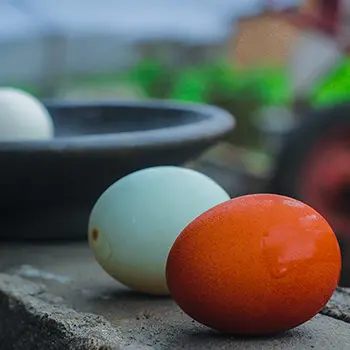Ah, do you want to raise chickens or ducks? For most people, the answer to that question will depend on which they prefer in the debate of duck vs. chicken eggs.
Both chickens and ducks are prolific layers, and once you’ve established a good-sized flock that can withstand rough weather, predators, and occasional illnesses, you’ll be swimming in eggs. But which type suits your taste and needs best?
Let’s take a closer look.
Duck Vs. Chicken Eggs: Breakfast
If you’re the type of person who really just wants to crack a few eggs with their morning toast, you’re probably after chicken eggs. They’re a little smaller in most cases, but they’re what the typical American grows upon. They’re the little white or brown eggs from the store, they’re the ones every breakfast restaurant has; America runs on the chicken egg.
However, there’s nothing wrong with eating a duck egg for breakfast, either. If doing so, I strongly recommend soft boiling your duck eggs versus frying them up in a pan. Unsure of how to soft boil an egg? Place clean duck eggs in cold water and bring to a boil for 10-12 minutes. For some smaller duck eggs, this may result in hard-boiled eggs. In all honesty, it takes a little wiggle room and you’ll get the hang of it after a batch or two with your specific ducks.
Allow the eggs to cool or toss them in an ice water bath before peeling. Peel your egg, split it, and dip your toast or pancakes in the creamy to runny yolks. They’ll bring a depth that chicken eggs can’t touch.
So who really wins the breakfast debate? I’ll go with chickens because chicken eggs are so common, but ducks deserve a seat at the table, too.
Duck Vs. Chicken Eggs: Cooking
For day-to-day cooking, you’ll see “1 large egg” in so many dishes that you’ll simply assume that they require a chicken egg. And guess what? You’re probably right.
But they’re wrong.
Duck eggs are the superior choice for everything from southwestern scrambles to fried rice (and back again).
There’s nothing wrong with using a chicken egg, but you’ll use fewer duck eggs (which will always be larger than any chicken egg) and get a “meatier” bite from the bits of egg throughout your dish. That said if you’re using a very delicate recipe, that may not be the best thing.
For this category, we really do have to give it up for the duck eggs. Sorry chickens; you’re great for breakfast and stand alone better than the typical duck egg, but duck eggs work best when you’re really dishing lunch out.
Baking
This is where there’s such a clear winner that one of them gets left in the dust.
The chicken coop dust.
Duck eggs are superior in every possible way when it comes to baking. Go ahead, try your favorite recipe with duck eggs instead of chicken eggs. We’ll wait.
Yeah? Did you do it? See how much richer your favorite sweets are? I know it blew my mind the first time I did it, too.
The higher protein, the thicker whites; simply everything about the usual duck egg makes it a superior choice for baking in your kitchen compared to chicken eggs.
That doesn’t mean you’ll get a subpar product if you work with chicken eggs. After all, they’re more common and less expensive and I absolutely understand if you don’t want to have to go out of your way to source duck eggs to experiment with. The world is costly at the moment. We all understand.
But if your ducks are laying in your backyard or your back pasture, gather up some eggs for your cookies and brownies, and cakes. Don’t head to the chicken coop, head to the pond. Because duck eggs win this category hands down.
Duck Vs. Chicken Eggs: For Those Of Us Medically Sensitive Sorts
For those exploring the duck vs. chicken eggs debate with health concerns in mind, it’s crucial to consult your doctor before making any decisions. While high cholesterol is often the first consideration, many other illnesses and sensitivities could react to eggs, egg products, or foods containing them.
That said, chickens take a hesitant win here due to their eggs’ lower fat and cholesterol content. However, it’s important to note that all eggs pack a hefty cholesterol punch. On the plus side, chicken eggs are more commonly available in substitutes and egg white products, which you won’t typically find with duck eggs.
Final Thoughts
The biggest debate often comes down to duck vs. chicken eggs and which type of bird suits your needs better. Chickens tend to be slightly easier to care for, especially if you don’t have a small pond or aren’t raising Muscovy ducks, which don’t require a water feature in their enclosure. That said, both ducks and chickens can still be pretty labor-intensive.
Overall, most duck and chicken breeds available from commercial hatcheries are healthy and robust. They’ll keep producing eggs steadily until the light starts to fade at the beginning of winter—and some breeds, whether duck or chicken, will continue laying well into the colder months.
Related: These Animals Are Stealing Your Chicken Eggs
Once you’re awash in eggs, you’re going to need to do something with all of them. We strongly recommend doing one of two things: Cracking your eggs and freezing them, then adding those frozen eggs to a zippered bag in your deep freezer.
These will keep for up to two years and are easy to add to anything that requires a scrambled egg (and if it’s a soup or a stew, why even bother thawing it? Just toss it right in!). You may also choose to pickle them if you’re a fan of pickled eggs. We’ll cover that another day, however, as well as the care of chickens, ducks, and assorted other egg-productive poultry.
Tell us down below if we’ve helped you root out which species you’d like to keep, or if you’ve decided to keep both (like I have) so you have a variety of egg types on hand at all times! Happy poultry keeping!
You may also like:
Why You Should Raise Ducks Instead Of Chickens
The Only Plant That Will Make Your Poultry Lay More Eggs Than Usual (Video)
Ingenious Ideas For Taking Care Of Your Chickens
Livestock Animals You Should Start Raising For The Upcoming Economic Crisis





















